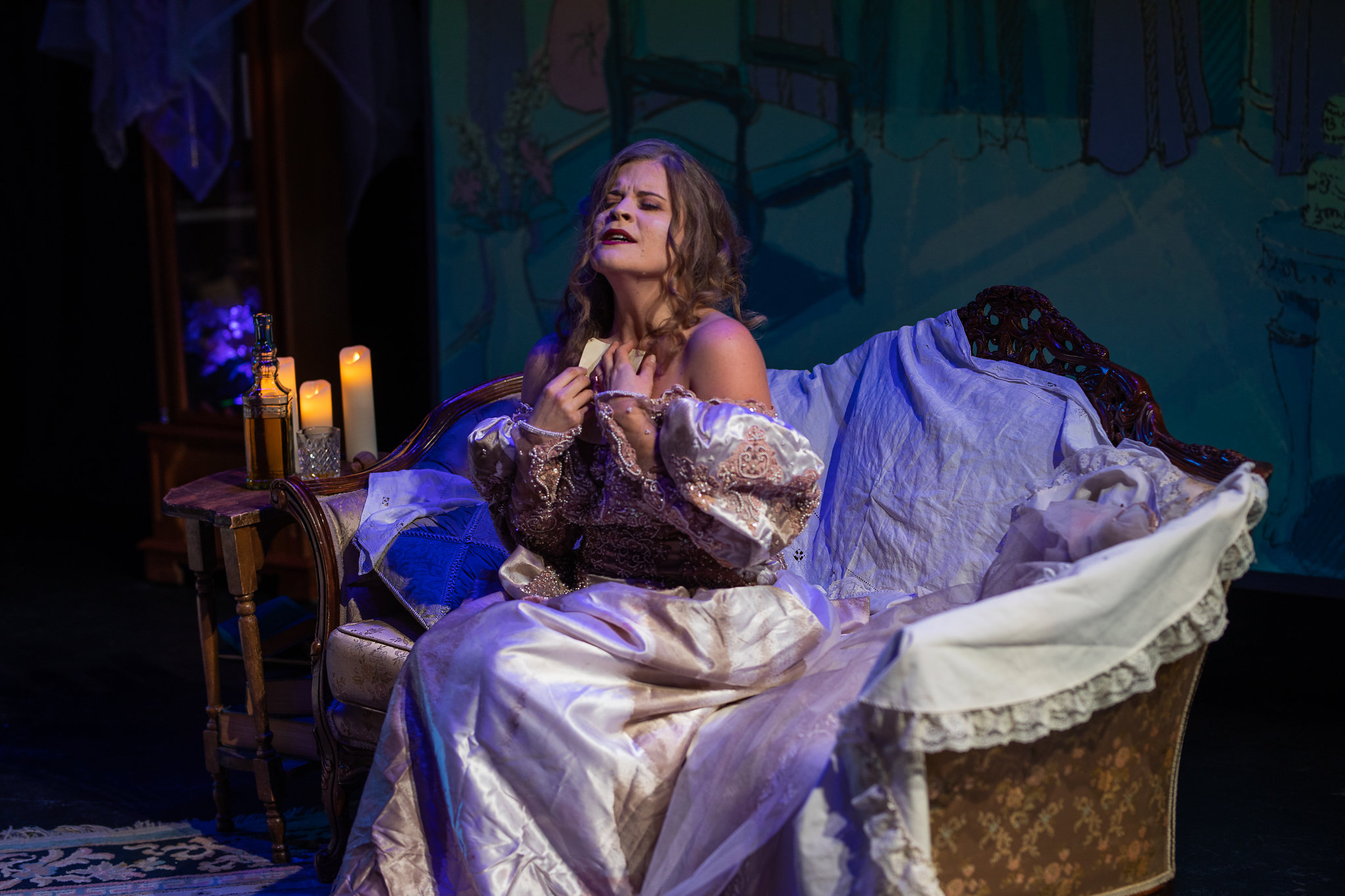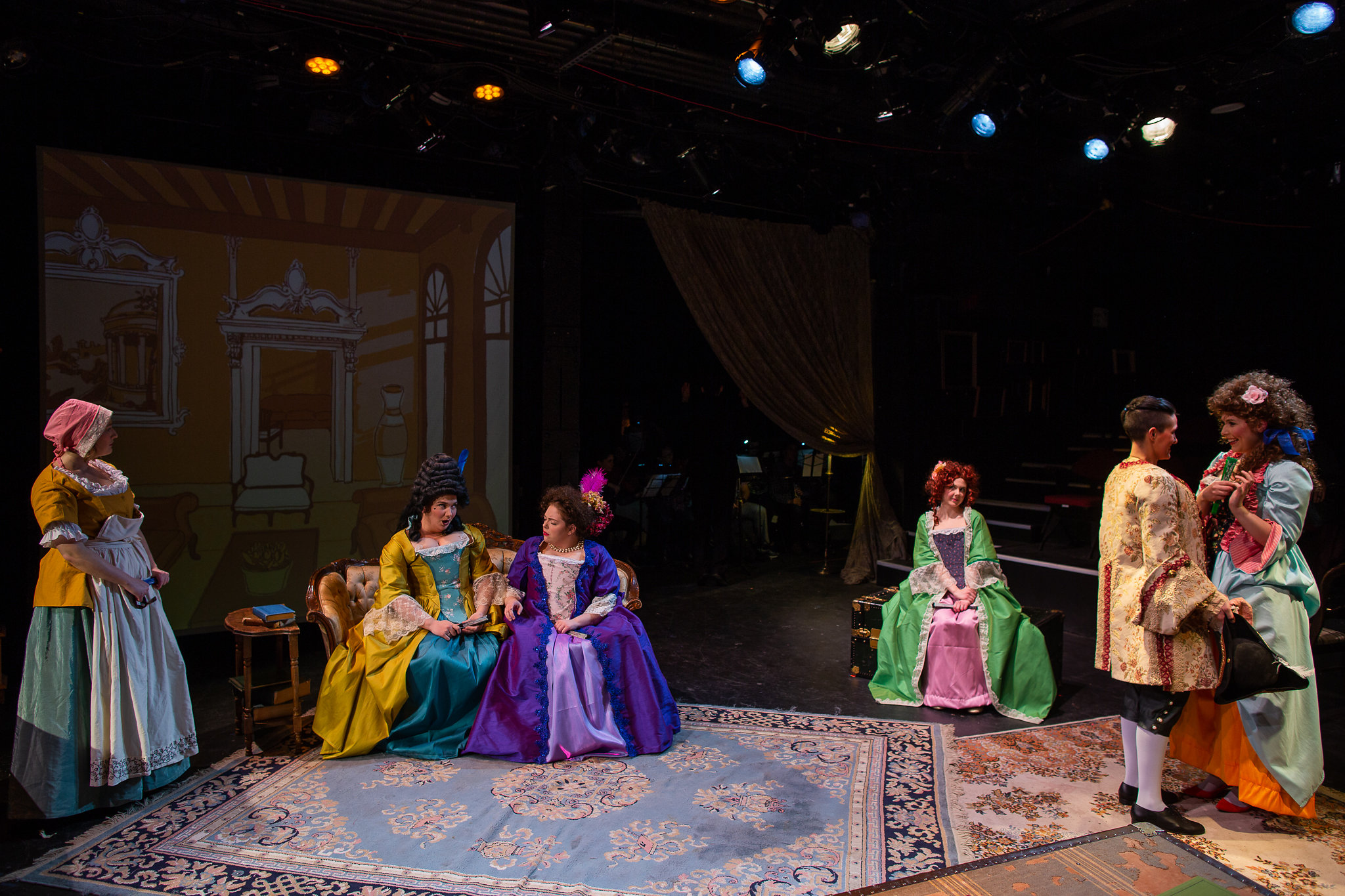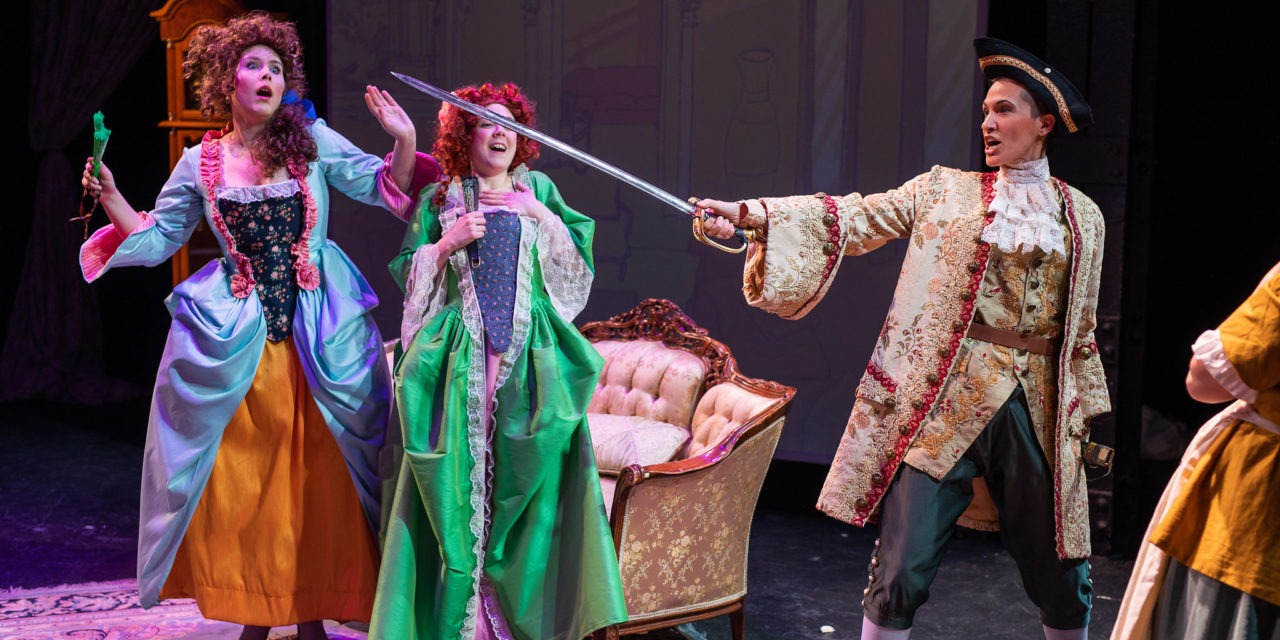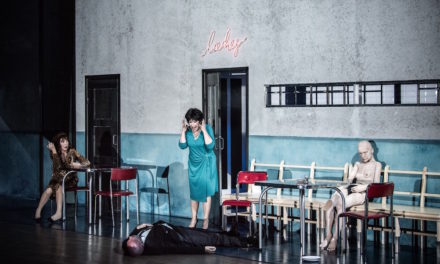Metrowest Opera had a full audience in the BCA’s smaller space on Saturday evening for their double act of Miss Havisham’s Wedding Night, and The Beautiful Bridegroom, which they titled Old, New, Borrowed, Blue. Though seemingly disparate pieces thematically and certainly musically, the two pieces worked with the thread of the “unmarried woman” in each and certainly both pieces, written in the 20th and 21st centuries respectively, contain borrowed source material. After the voyeuristic feeling and emotional intensity of Argento’s musically avant-garde Miss Havisham, Dan Shore’s more tonal and comedic Bridegroom was like a lovely dessert with which to end the evening. It was a fine night of singing with simple, polished sets, striking costumes and projections that worked beautifully in BCA’s intimate space. Metrowest Opera has moved this season’s production into the city of Boston proper instead of the Metrowest area, and so is in the process of a re-branding. This will not only incorporate their new location, but a new title will more fully expand their mission statement of staging operas with gender parity, in part no doubt to oblige their auditioning population of majority female young artists and to make a statement about casting and employment in the opera world.
When Dominick Argentos’ Miss Havisham’s Fire became problematic as a full-length piece, his drama Miss Havisham’s Wedding Night was extracted as a one-act opera. Unlike the typical elderly image of the Miss Havisham character from Dickens’ Great Expectations, Director Cassandra Lovering imagined her as a woman in her late forties, still giving her roughly thirty years of reliving the night she was jilted behind her by this point, and in no way, making it less tragic. By seeing a still fairly young woman actively closing out the world, we’re pulled more into the vacuum of her life.

Photo Credit: Nile Scott Shots.
Tamara Ryan as the disturbed jilted spinster Miss Aurelia Havisham is a fantastic singing actor in this one-woman piece written for soprano. Ryan conveyed so many colors of the character and gave us more than an inkling of her character’s early signs of madness even before her wedding day trauma. There is much to be conveyed. Through mostly flashback, Havisham recalls that everyone expects a special wedding day for this eccentric bride, and so the seeds are sown for her character’s downfall. And in her meditations on time, she ponders how foolish the outside world is to even believe in the construct, making her forced reclusion in her wedding gown strangely logical.
The piece is dense in metaphors about not only time but on madness, with Havisham herself acknowledging her own madness as perfunctory fact in an imaginary conversation. Ryan and Lovering brought out every aspect of these reflections to a chilling climax. Miss Havisham re-reads the letter from her fiance and lives the moment once again, (likely her daily ritual, like the tea, she is served at a certain time), while projections show us he has no intention to marry her that day “nor any other day hereafter.” After the projected text shatters into nonsense, Havisham re-enacts an imaginary kiss with her bridegroom in a bizarre sort of exiled virgin’s fantasy ritual. Havisham uses a blunt object to bang at the room’s grandfather clock. Ryan’s comedic timing shone through when, after a screaming fall to the floor and complete silence in the house, she emerges calmly to receive Estella for tea and talk to her about men. For this part alone, perhaps, background on the novel adds at least another layer of foreboding. This tableau ends the opera. In a history of mad women in opera, Argento’s Havisham is no one-dimensional lunatic soprano, especially in this nuanced production.
Vocally, despite Ryan’s adeptness with all aspects of movement and expression, the top of the range has a wobbling vibrato when sung full-out and the clarity of the middle voice and diction were compromised. Consonants throughout were very well-executed, so as to make super titles unnecessary; the purity of the vowels sometimes conveyed strangely, and the clarity of the middle voice suffered.
The cast of Dan Shore’s The Beautiful Bridegroom clearly bonded and developed a raucous and hilariously charming dynamic. Extra comedic beats and overwrought reactions abounded. The only complaint that could be made was that it bordered on too much camp. Like the piece itself, the gestural language didn’t take its anachronisms too seriously. Though technically set in Restoration-era Denmark, contemporary sexual politics take the forefront, with characters proclaiming in the final bars that they don’t need any baritones or tenors; the women could do everything on their own. Costumes perfectly reflected this with accurate period shapes in outlandish colors and fabrics. Miss Havisham’s candlelit Hope Chests overflowing with unused linens were cleverly closed and re-used as set pieces for this half. Projections were reminiscent of Monty Python cut-outs and added great effect when combined with the thematic musical material.

Photo Credit: Nile Scott Shots.
Throughout Bridegroom, we see and hear nods to operas past, with a woman seeking a much younger man played by a pants role mezzo, recalling the Marschallin in Der Rosenkavalier. There are musical forms and stock characters that reference 18th-century composers like Mozart. But the audience members don’t need any of this knowledge to enjoy the fast-paced farce. Ultimately, Terentia decides to marry an older suitor who’s been after her, but whose character we never see, and her daughter feels no less attracted to Captain von Frauenliebe despite it being revealed that he has “turned into” a woman.
Singing throughout this piece was exceptional. Like the direction, the volume was sometimes too much for the small space. This is a preferable problem for young singers embarking on careers. Abigail Whitney Smith as Terentia had a creamy voice throughout the entire register and great comedic timing. Kristin Fahning and Laura Intravia played off of one another well as her two daughters, both in their purposefully stilted-looking choreography and their vocal shine. Emily Harmon as the matchmaker Madame Kirsten, possessed a smooth vocal quality perfectly suited to her conniving character. Jaime Hartzell’s turn as the Victor/Victoria character Captain Von Frauenliebe was aptly androgynous in a very full-sounding mezzo-soprano voice. Jennifer Soloway as Pernille cut over the orchestra enormously, though sometimes bordering on the shrill. She had the most exceptionally funny faces of the ensemble and made the most of her comedic beats. These alone were extra commentary in the piece. A small chamber ensemble led by Brendon Shapiro created a cohesive ensemble for both pieces.
The director’s notes acknowledge that we may think we are beyond the question of what a woman’s place in the world without a husband. Both of these well-executed operas posit the question in past eras but prove that the question still has relevance. And delving into a mad woman’s psyche, though an often overused trope in opera, was regardless full of wells of great insight and paired well with a madcap finish.
This post was written by the author in their personal capacity.The opinions expressed in this article are the author’s own and do not reflect the view of The Theatre Times, their staff or collaborators.
This post was written by Katrina Holden-Buckley.
The views expressed here belong to the author and do not necessarily reflect our views and opinions.


















